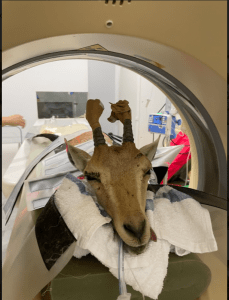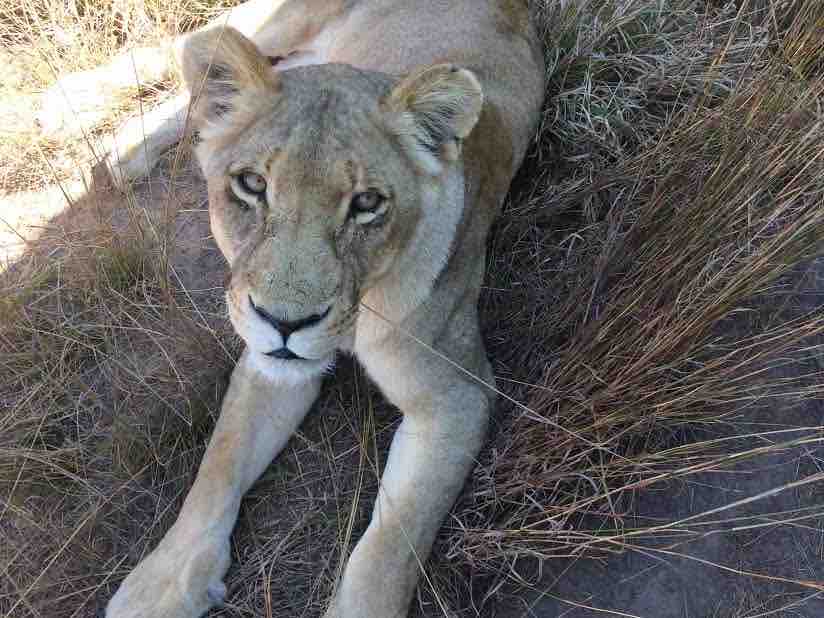Amid the COVID-19 pandemic, much like everyone else, my summer externship plans were severely impacted. However, in the middle of spring semester 2021, I sought out an opportunity over 5000 miles away that resulted in being one of the most rewarding experiences of my life. The Israeli Wildlife Hospital in Tel Aviv, Israel, which operates as a non-profit organization with shared ownership through the Ramat Gan Safari/Zoological Center and Israeli National Parks Authority, is responsible for the treatment, management and release of all wildlife brought to its doors. As the sole wildlife hospital in the country, this unique hospital manages a heavy and varied daily caseload, treating both wildlife and zoo animals. The hospital employs a multi-faceted team of veterinary professionals, supported by zookeepers, technicians, curators, ecologists, zoologists, and volunteers to work collaboratively to provide advanced animal care. It was in this setting that I was able to experience nearly all facets of wildlife/zoological animal care – my first clinical experience with such varied wildlife/zoo patients.

Sometimes triaging upwards of 20+ patients per morning, animals in need of care were brought in from park rangers and ordinary citizens. Creating a prioritized triage and assessment of the patients was paramount for the maximal survival of the patients. In addition to individual requirements, fluid therapy was a hallmark of initial care, at times requiring catheterization. As a result, I fine-tuned my clinical skills/techniques, facilitated catheters, participated in numerous surgeries and devised treatment plans and dietary/husbandry techniques with the veterinarians and keepers.
An all-hands-on deck participation was often required for the most fragile of patients, from raptor chicks like common and lesser Kestrels and Scops Owls to non-raptor winged animals like kingfishers, swallows, bee-eaters, and occasionally bats. In terms of small mammals, Western Eurasian hedgehogs infected with Scabies were a common occurrence – sometimes with more severe crusting, and/or unrelated trauma. Further diagnostics employing imaging modalities, fluid plans, dosing/delivering medications, etc. rapidly and efficiently were often needed.Patients often needed temporary homes or to be quarantined to prevent the spread of pathogens between patients. I was impressed by the incredible knowledge of the head keepers, who were so attuned to each species’ requirements and were able to direct appropriately.

The diversity of animals I was exposed to was awesome! Highlights included treating an African elephant in the zoo with signs of colic, chameleons from the Galilee region, stone-curlews, eagle owls, and a large male ibex with a broken femur. Throughout the three-month externship and while working in visual distance of zebras, rhinos, waterfowl, and the like, I participated in the care of many different types of animals, each of which had specific species protocols. For example, critical protocols for hooved animals like gazelles and ibexes (often brought in as a hit-by-car accidents) were in place to prevent the spread of harmful disease. Foot and Mouth disease is a highly contagious aphthovirus with varying strains throughout the Middle East. If introduced, this would be detrimental to the Safari animals. Impromptu field work required us to meet the park rangers at the gate of the safari, perform a quick and calm physical assessment, collect blood, run an ELISA and once negative, bring the patient into the grounds for a full evaluation. Additionally with these ungulates, capture myopathy was another real and serious implication, given the animal’s extensive journey to the hospital from the wild.
Israel is a small country and the team must constantly create appropriate treatment and release plans for their patients, taking into consideration neighboring countries’ cultural and animal care differences as many of the species are migratory and traverse through borders. Often, we saw raptors with lead bullets, metabolic bone disease, and clear signs of cut wings and rope strangulations. These examples highlight the cultural differences in neighboring countries in direct contrast to Israel’s strict animal care laws – preventing wild animal ownership and hunting.

One case involving the complete exam/work up, diagnosis and neurologic surgical treatment of a female ibex with Sarcocystis neurona sticks out in my memory. The young female ibex was brought to the hospital with an appreciable left-sided head tilt and ipsilateral circling. Radiographs including skull images were taken, revealing no obvious insult or head trauma. Thereafter, a conservative treatment protocol was devised. Without any resumption of clinical signs over the next days, one of the country’s top neuro-specialists from the Koret School of Veterinary Medicine came to perform a thorough neurologic exam and advise the team towards the course of action. A CT was needed in which I, along with one of the house veterinarians, transported the ibex and another neurologic in-patient (a fox) to a nearby advanced small animal practice to perform the CT. A large cyst was evident in the CT images and CSF fluid was collected and analyzed. Sarcocystis neurona was the top differential and we prepped for surgery. It was incredible to watch the surgery and experience this so early in my veterinary career. The surgery was a profound success as the gelatinous cyst (confirmed to be Sarcocystis neurona) atop the cerebellum was removed. Within days of treatment her head tilt resolved and approximately two weeks post-surgery, I participated in her release back to the wild. Driving south, to the Mitzpe Ramon Crater in the Negev desert, the beautiful scenery and landscape was only surpassed by the joy of seeing the release of the ibex to her native environment. She darted out of her carrier and seemed to appreciate the scenery as much as I did. With a parting glance, the animal successfully reintegrated back to her land. The magic of this story was so special that it was written about in the “Yediot Achranot” [one of the major newspapers in Israel] with my name written in Hebrew attached – quite the feature!

Among the usual stresses that come with the end of a semester, I would never have imagined experiencing intense rocket attacks. As sirens sounded, video from the safari displayed a peculiar behavior: adult elephants began circling the calves in a predatory-protective mode https://www.ynetnews.com/environment/article/BkbDNgOF00. Furthermore, the safari itself was directly impacted when a missile landed adjacent to one of the monkeys exhibits, and shrapnel pierced the back of one primate and simultaneously burned the wings of a nearby bird. Safari veterinarians quickly performed lifesaving treatments on the animals and fortunately, none lost their lives. Both stories were broadcast in the Israeli media outlets and garnered an overflow of support from the Israeli population. While those 11 days were truly frightening, with sirens blaring throughout the night and day at any moment, interceptions from Israel’s Iron Dome Defense system overhead, I was grateful to have a strong support network of family, friends and Cornell faculty willing to work with me to complete the semester.
The four months I spent in Israel posed a truly unforgettable experience. I befriended people from all over the world, explored the country, improved my Hebrew knowledge and underwent substantial personal development. I learned an array of clinical skills, zoological knowledge, and management skills from experts. The high quality of medicine at the Israeli Wildlife Hospital with an incredibly knowledgeable, understanding, positive, and welcoming team made this experience unforgettable.
For students interested in externship opportunities, the team is eager to welcome veterinary students and I couldn’t recommend this experience any further. They may be reached at hospital@safari.co.il (Hebrew knowledge not required) and follow them on Instagram @Israel.wildlife.hospital and the Ramat Gan Safari: @Safari_Israel
Israeli Wildlife Hospital Homepage:
https://www.wildlife-hospital.org.il/en/%D7%93%D7%A3-%D7%94%D7%91%D7%99%D7%AA-copy/
 Jared Zion, Class of 2023, hails from New York City. Since Jared’s start at Cornell, he has been in pursuit of exploring unique veterinary opportunities. His passion for non-traditional species is driven by the uniqueness, individual requirements and complexities in every patient – harnessing a huge drive through his path in veterinary medicine. Some of the most important things in Jared’s life involve creating genuine connections, travel, learning about different cultures, and creating a balanced, stress-minimal life that will enhance his career working with such a variety of species in the future.
Jared Zion, Class of 2023, hails from New York City. Since Jared’s start at Cornell, he has been in pursuit of exploring unique veterinary opportunities. His passion for non-traditional species is driven by the uniqueness, individual requirements and complexities in every patient – harnessing a huge drive through his path in veterinary medicine. Some of the most important things in Jared’s life involve creating genuine connections, travel, learning about different cultures, and creating a balanced, stress-minimal life that will enhance his career working with such a variety of species in the future.

